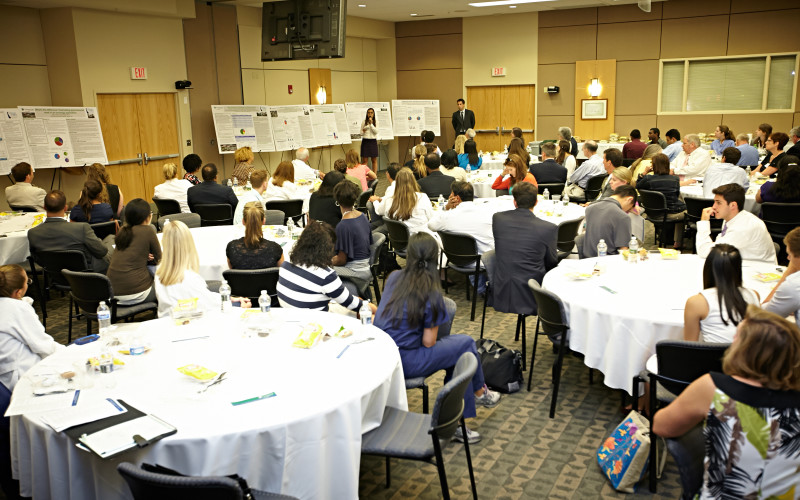Students share research at INBRE Scholars Research Day

Because of the success of a 10-week research program at Christiana Care Health System, cardiologist Michael E. Stillabower, M.D., FAAC, is closer to deploying new wireless technology to take patients’ blood-pressure readings.
As part of the Delaware IDeA Network of Biomedical Research Excellence (INBRE), Christiana Care providers including Dr. Stillabower recently teamed with promising high school students and undergraduates, such as Wesley College nursing student Lacey Olin, to explore research topics aimed at improving the delivery of health care.
Dr. Stillabower and Olin, with Angela DiSabatino-Herman, MS, RN, manager of cardiovascular clinical trials and a Value Institute scholar, found that blood-pressure readings taken with wireless technology in a doctor’s waiting room are accurate and may provide a way for busy medical staffs to record several readings during cardiology visits, a suggested guideline that can be hard to implement because of time constraints.
Olin and other student researchers reported on 25 projects at the annual Scholars Research Day & Luncheon held in August at the John H. Ammon Medical Education Center. Olin was one of 34 students — building on their interest in health and medicine — who devoted 300 hours of their summer to research projects. These were led by Christiana Care mentors seeking answers to research questions that may one day lead to better health outcomes at lower costs.
“We want to continue to increase our capacity to do research at Christiana Care, and INBRE has an important role to play in that,” said Scott Siegel, Ph.D., principal investigator for INBRE at Christiana Care. Siegel is director of Psychosocial Oncology and Survivorship at the Helen F. Graham Cancer Center & Research Institute.
The students’ 25 projects include: a study of complications associated with new oral anticoagulate medications; a look at data to see what social needs of cancer patients sometimes go unmet; and a study of consent-to-treatment forms with an eye toward making the wording of questionnaires more patient-friendly.
“I think of lot of us who are faculty members are pleasantly surprised by the amount that students can contribute, as well as the sophistication and the quality of work they accomplish in a single summer,” said Seema S. Sonnad, Ph.D., director of health service research at Christiana Care’s Value Institute, a lead sponsor of INBRE.
At the same time, providers gain important data on valuable research topics. “Our project, looking at wireless blood-pressure measures, gave me the opportunity to answer a question that has been on my mind for a while and provided personnel to do the research,” said Dr. Stillabower. “The project also gave me information on how we could do this in our practice.”
For the research, Olin worked with the iHealth cuff, which sends readings wirelessly to a designated health care provider’s iPhone or iPad. In Stillabower’s waiting room, Olin took three sets of measurements with 20 patients prior to a consultation with the cardiologist. A fourth measurement was taken during the office visit with Dr. Stillabower, and while the blood pressures tended to be slightly higher in the waiting room, the difference with those taken in the doctor’s office was not statistically significant.
“The iHealth device incorporates the blood-pressure measurement instrument into the cuff, eliminating the usual tubing,” said Stillabower. “Measurements are transmitted wirelessly to an iPhone or similar device, making it possible to collect and store multiple blood pressure measurements very efficiently.”
As students contribute to important medical questions and build research infrastructure, they gain valuable experience for becoming clinicians and researchers, said Nicole Duffy, Ph.D., a psychologist with the Helen F. Graham Cancer Center & Research Institute, who studied the unmet social needs of cancer patients with student Mary White of the University of Notre Dame. White said the INBRE experience was confidence-building as she considers a career in medicine.
Students gain exposure to clinical situations and work collaboratively with patients and medical staff, acquire hands-on experience in gathering data, and learn how to analyze and present medical research.
In one project, Brian Elliott, a University of Delaware senior, and Jack Wehmeyer, a Wilmington Christian School senior, focused on the administration of the amino acid L-carnitine as a novel adjunctive treatment of sepsis, with the hope of reducing organ failure. (The study is expected to continue until June 2017.)
“The project was a great exposure to many aspects of how hospitals work, and I would recommend INBRE to students interested in science and medicine as a potential career,” said Wehmeyer.
INBRE is a program of the National Institute of General Medical Sciences that has granted money to the University of Delaware since 2001 to promote student and faculty research, state-of-the-art instrumentation, greater health care efficiency and new medical procedures that offer improved outcomes. In pursuing these goals, the university has formed a strong partnership with Christiana Care to move biomedical research forward, said Steven J. Stanhope, Ph.D., INBRE principal investigator for the University of Delaware.
Other Delaware INBRE partners are Wesley College, Nemours, Delaware State University and Delaware Technical and Community College.
“INBRE demonstrates that Delaware is the great collaboration state, and this makes it possible to turn cutting-edge research into quality patient care much more quickly than was possible before,” said Stanhope.
Research will continue, with the university receiving notice in August that INBRE will be funded with close to $18 million in federal dollars over the next five years. The state of Delaware is expected to contribute $5 million in matching funds.
Photo gallery: INBRE Scholars Research Day
Error fetching Flickr photos: A feed could not be found at `https://api.flickr.com/services/feeds/photoset.gne?lang=en-us&format=feed-rss_200&nsid=28142983@N07&set=72157650262288522&per_page=50`; the status code is `404` and content-type is `text/html; charset=UTF-8`